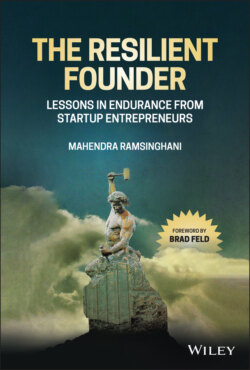Читать книгу The Resilient Founder - Mahendra Ramsinghani - Страница 30
SELF-IMAGE AND INEPTITUDE
ОглавлениеMcArthur Wheeler robbed two banks in Pittsburgh in broad daylight. He had worn neither a mask nor any form of disguise and was promptly arrested in a few hours. It was not just incompetence but lack of application of knowledge of lemon juice. Wheeler was under the flawed impression that applying lemon juice to his face made him invisible to the video surveillance cameras. Thanks to this inspiration and case of stupidity, researchers David Dunning and Justin Kruger went on to publish a fascinating study, “Unskilled and Unaware of It: How Difficulties in Recognizing One's Own Incompetence Lead to Inflated Self-Assessments.”3
The summary of the study is quite simple. We think we are way smarter than we actually are. And because of such inflated self-images we tend to make stupid choices. Like rubbing lemon juice on one's face and then robbing a bank. And our stupidity makes it nearly impossible for us to realize that we are – pause for a drumroll – stupid. Dunning and Kruger state this in a far more polished manner. Read on.
People tend to hold overly favorable views of their abilities in many social and intellectual domains. Not only do these people reach erroneous conclusions and make unfortunate choices, but [also] their incompetence robs them of the metacognitive ability to realize it.
Across four different studies, the authors found that participants scoring in the bottom quartile on tests grossly overestimated their test performance and ability. Although their test scores put them in the 12th percentile, they estimated themselves to be in the 62nd (see the following figure). In other words, we assume ourselves to be fives times better than we actually are. Imagine trying to fly an airplane with such an inflated self-image. Or performing brain surgery. The BBC summarized the findings of the Dunning-Kruger study with the headline “The More Inept You Are the Smarter You Think You Are.”
But here is the best part. The researchers conclude that improving the skills of participants increased their metacognitive competence, and helped them recognize the limitations of their abilities. In other words, as our skills improve, we come to realize our own stupidity. As W. B. Yeats writes in his 1920 poem “The Second Coming,”
The best lack all conviction, while the worst
Are full of passionate intensity.
To invert this effect, and calibrate your self-image, try to think about any skill in which you believe you are the best. Adjust that self-score downward by 5X and then start working toward building your skill. As your skill improves – voilà – the self-image gets calibrated magically.
Researchers have found that those who have high expectations of themselves and have a vulnerable ego are susceptible to suicide. What is this ego? And should it be vulnerable? Can it become stronger? Being unaware of such basic psychological notions, we are unable to decipher, let alone harness this strange inner force. Pick any book with its esoteric pearls of wisdom and you will find references to destroy your ego. The ego is an enemy. This is a fundamentally flawed notion in the context of entrepreneurship. Just as money is not the root of evil, but an excessive lust for money is, the ego is not the enemy. An inflated out-of-control ego, like an unbridled horse, is the enemy. A weak ego, unable to handle responsibilities and frustrations, overwhelmed perpetually is the enemy. The healthy ego, in fact, can be a founder's greatest ally, an essential resource in changing the world. A healthy ego is your wingman, your charioteer, your guide. It helps the entrepreneur to navigate the journey. It tackles everything with the ease and grace of an agile problem solver. A healthy ego could even become a force for good in society.
Having strong views of their own selves is supremely important for founders. It is indeed a precondition. A vulnerable ego can turn that same strength against its own self, destroying the inner drive. Freud holds the view that when we do not get what we yearn for, we turn against that very object of yearning. Sometimes that object can be our own life.
When Tim Ferris was contemplating suicide, he could well be yearning for something that he could not get. The self-view as a loser soon starts to propagate. The loser's mind then starts to descend into a steady drumbeat: “The world does not need another loser.”
From the trio of image, expectations, and ego, founders can turn some knobs around. We can paint our own self-image as work in perpetual progress. We can forgive ourselves and others and accept that we are not fully formed Greek Gods. At least not yet.
Our expectations of our work can be tied to self-transcendence as opposed to being stuck on hedonistic treadmills.
Our self-confidence need not collapse into self-doubt, leading into a downward spiral of fear and anxiety.
Above all, I often wonder if our ego can save us from frustrations, exhaustion, and this gnawing sense of hopelessness.
If yes, how do we go to this “ego-gym” and build this strange muscle inside us, in a healthy way?
Especially when the world out there has declared the ego to be the enemy.
